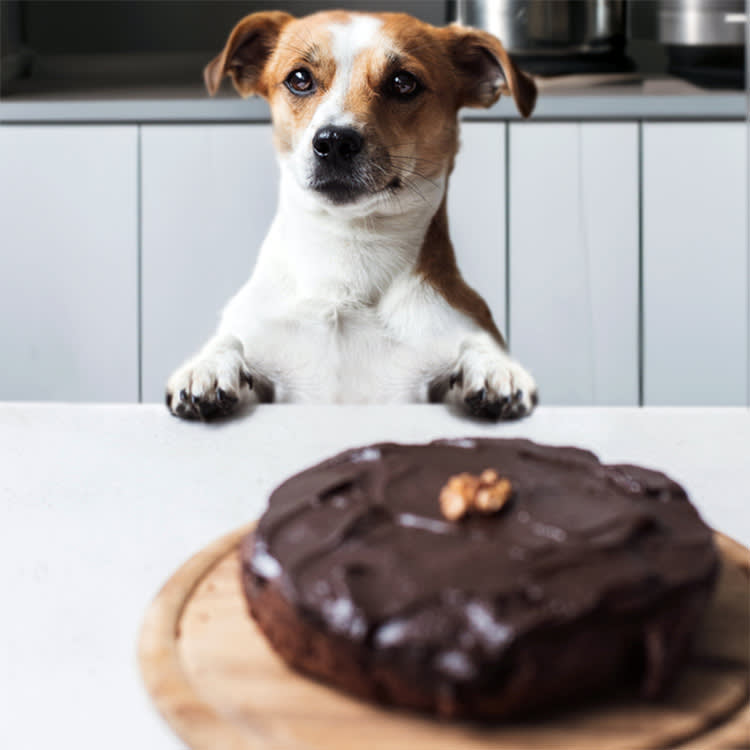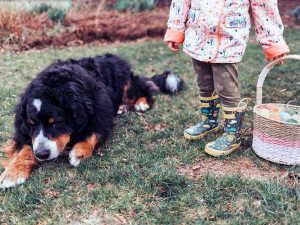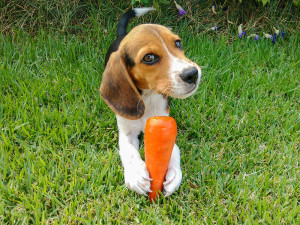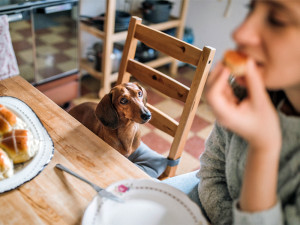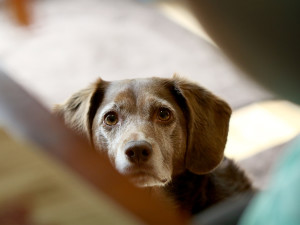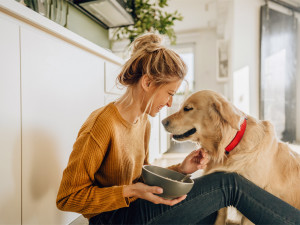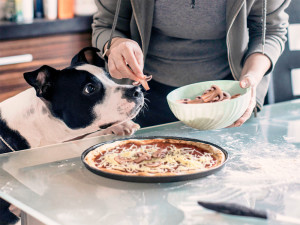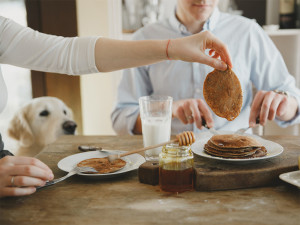Can Dogs Eat Chocolate?
Keep those chocolate bunnies far away from your pup this Easter (and always)
Chocolate seems to be the perfect accompaniment to any big event – from birthdays to break-ups. As Easter approaches, it might even seem perfectly acceptable to sprinkle your garden with delicious chocolate eggs and bunnies. But if you have dogs, you will definitely want to skip the chocolate egg hunt and keep all chocolate out of reach. Thankfully, there are plenty of c anine-friendly alternatives on the market to keep them happy.
Unfortunately, chocolate is toxic to dogs and is one of those foods that should never be shared. Read on to learn more about the risks of chocolate for dogs.
Nutrition facts about chocolate for dogs
Chocolate comes from cocoa beans, which are the seeds of the cacao tree. The seeds are processed into chocolate liquor, which is a paste that is then used in the production of chocolate. Chocolate is often categorised into three main varieties: dark chocolate, milk chocolate and white chocolate.
These all have different properties with their main difference being their content of pure cocoa. They also may include additional ingredients, such as sugar, fat, vanilla and added flavours from nuts, spices, dried fruit, caramel and more. Additionally, there are many chocolate-flavoured foods including baked goods and drinks that use cocoa powder for flavouring.
The compounds that make chocolate toxic to dogs are called methylxanthines – specifically theobromine and caffeine – found in the pure cocoa. These compounds cause stimulation of the nervous system along with digestive upset and signs, including vomiting, diarrhoea, agitation, tremors, seizures, elevated heart rate, elevated body temperature, and in extreme cases, coma and/or death.
For these reasons, chocolate is never a safe food to share with your pup. Whether they experience mild signs or more severe signs of toxicity depends on many factors, including how much concentrated cocoa was in the food they ate and how big your dog is. The more concentrated the product (looking at you, dark chocolate), the more serious the potential signs will be.
It is never good for dogs to eat chocolate of any kind, and you should contact your vet and the Animal PoisonLineopens in new tab if you are concerned that your dog ingested any products containing chocolate.
Is chocolate good for dogs?
No, definitely not. Chocolate is not good for dogs and is actually toxic. It is one of those foods that surprisingly is fine for us but can be very dangerous for our pets. How dangerous it is depends on how concentrated the cocoa is in a particular chocolate item and the size of the dog. Smaller dogs will get sick from smaller quantities, while larger dogs need to eat a larger amount to feel the effects.
However, this also varies based on how concentrated the product is, so a large dog could very easily get sick from eating concentrated dark chocolate, too. Here are some of the specific reasons chocolate is toxic to dogs
Theobromine: this is the primary compound found in chocolate that causes serious complications. In small amounts, it can cause mild digestive upset, while at higher doses it has effects on the brain, heart and respiratory system.
Caffeine: this is also a methylxanthine found in smaller amounts in chocolate. It can cause similar signs to theobromine, including digestive upset, hyperactivity, tremors, seizures, elevated heart rate and high body temperature.
High fat: even if your dog does not eat enough chocolate to suffer from the toxic effects of methylxanthines, the high-fat content of many chocolate foods can cause additional problems for your pup. High-fat foods can cause digestive upset, including vomiting and diarrhoea, and puts dogs at risk for more serious pancreatitis.
High sugar: chocolate-based foods are often high in sugar, too, and this is unhealthy for dogs. Too much sugar can lead to weight gain and put dogs at risk for obesity-related health problems like diabetes and arthritis.
Other ingredients: chocolate products may also contain other ingredients that are toxic or unhealthy for your dog. This includes sugar-free chocolates with xylitol, as well as ingredients like raisins, macadamia nuts, nutmeg, cinnamon, alcohol and more.
Can dogs eat any kinds of chocolate?
No, all chocolate needs to be off-limits. While some chocolate products, like white chocolate, contain only very small amounts of cocoa, the risk is still present, especially for smaller dogs, to get very sick. And even if there is not enough pure cocoa in the product to lead to a toxic effect, your pup is still at risk from getting sick from the high-fat and high-sugar content in many of these foods, as well as any other ingredients that may be unsafe for them.
Is chocolate safe for dogs?
Chocolate is not safe for dogs at all. This cannot be overemphasised. It’s a very common reason for dogs to end up in an emergency clinic and can be a very scary experience for both pups and their parents, not to mention their wallets.
Try to do everything you can to keep chocolate out of reach including making sure your home is as dog-proofed as possible, and teach your dog to respond to cues like ‘leave it’ to redirect them from unsafe situations. Of course, accidents do happen, so if you discover that your dog has eaten chocolate, be sure to take the following steps:
Contact your vet and/or the Animal PoisonLine right away so they can help you calculate how much cocoa per KG of body weight your dog ingested and how concerned you need to be.
Save any wrappers, especially the ingredient list, to share with your vet.
Head to a veterinary emergency clinic right away if you are not sure how much your dog consumed, or if you are advised by a professional to seek care.
The bottom line: can dogs eat human food?
Dogs can eat many human foods, and there are lots of options that are safe and even healthy for your pup to share. Chocolate is a good example of why it is very important to do your research, however. There are some foods that are perfectly safe for us but can cause serious illness in our pets, and others that may not be toxic but are just not healthy for them.
For this reason, try to stick to plain, whole foods like lean meats and safe fruits and vegetables. This avoids the complications of added ingredients, oils, and spices that may not be safe and is most likely to be a healthy choice for your pup, too. If in doubt, always check with your vet before sharing anything with your pet.
And while the occasional shared snack can be healthy and a fun bonding exercise, it’s also important to remember that your dog has unique nutritional needs and should be eating a complete and balanced dog food diet to avoid any serious nutritional deficiencies. All treats and table foods should be kept to less than 10 percent of your dog’s total diet to ensure they get the bulk of their nutrition from their dog food.
What dogs can eat at Easter
Dog-friendly Easter treats: opt for specially formulated dog treats that are Easter-themed. These treats are designed with canine health in mind, ensuring they’re both delicious and safe. Look for reputable brands that use high-quality ingredients suitable for dogs.
Fresh fruits and vegetables: treat your pup to their five-a-day as a healthy Easter snack. Applesopens in new tab, blueberries and celery are excellent options that most dogs adore to crunch on. Just be sure to remove any seeds or pits that could potentially be a choking hazard.
Plain cooked meat: if you’re planning a special Easter meal for your pup, plain cooked meat such as chicken or turkey can make for a tasty and protein-rich treat. Lamb is a seasonal treat that is filled with amino acids and protein for pups, just make sure they aren’t given any cooked bones and avoid seasoning or sauces, as these can upset your dog’s stomach.
What dogs cannot eat at Easter
Xylitol: this sweetener is a sugar substitute that is often found in sugar-free treats, but can also be a hidden ingredient in everyday items such as peanut butter. Keeping an eye on food labels is essential, as even small amounts of xylitol can cause a dangerous drop in blood sugar levels and liver failure in dogs.
Grapes and raisins: a staple in many Easter treats, grapes and raisins are extremely toxic to dogs, potentially causing kidney failure. Keep hot cross buns and fruitcakes containing these ingredients well away from your pup.
Frequently asked questions
How much chocolate can a dog eat?
None. Chocolate is toxic to dogs, and they should not eat it at all.
Is it OK to give dogs chocolate?
No, chocolate is toxic to dogs and should never be shared.
Why do dogs like chocolate?
Dogs are attracted to foods that are sweet and high in fat.
Is chocolate good for dogs?
No, chocolate is toxic and can even be deadly for dogs if they consume enough.
Can dogs eat white chocolate?
No. Even white chocolate usually contains cocoa, as well as being high in fats and sugars that can make dogs sick.
Is chocolate safe for dogs?
No, chocolate is not safe for dogs. It’s toxic and can cause serious illness and even death in dogs.
References:
ASPCAPro: People Foods Pets Should Never Eatopens in new tab
Merck Veterinary Manual: Chocolate Toxicosisopens in new tab
National Confectioner’s Association: Kinds of Chocolateopens in new tab
